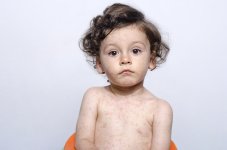David Baxter PhD
Late Founder
Measles cases climb sharply in Europe
CBC News
Augist 21, 2018
Half of cases are in Ukraine — but Italy, France, Greece also see significant rise
The number of measles cases in Europe jumped sharply during the first six months of 2018, and at least 37 people have died, the World Health Organization says.
The UN agency's European office said Monday more than 41,000 measles cases were reported in the region during the first half of the year — more than in all 12-month periods so far this decade.
The previous highest annual total was 23,927 cases in 2017. A year earlier, only 5,273 cases were reported.

The agency said half — some 23,000 cases — this year occurred in Ukraine, where an insurgency backed by Russia has been fighting the government for four years in the east in a conflict that has killed more than 10,000 people.
France, Georgia, Greece, Italy, Russia and Serbia also had more than 1,000 measles infections each this year.
Measles — among the world's most contagious diseases — is a virus spread in the air through coughing or sneezing. It can be prevented with a vaccine that's been in use since the 1960s, but health officials say vaccination rates of at least 95 per cent are needed to prevent epidemics.
Measles typically begins with a high fever, and sometimes a runny nose, cough, and red and watery eyes. Small white spots can also appear inside the cheeks. Later, a rash develops on the face and neck and spreads down the body.
Most people who develop measles recover, but it can cause serious complications that can turn deadly. Complications include blindness, encephalitis (brain swelling), severe diarrhea leading to dehydration, ear infections and severe respiratory infections, according to the World Health Organization.
Children under five years of age are the most vulnerable. And despite the availability of a vaccination, measles is one of the leading causes of death among young children around the world.
Vaccine skepticism remains high in many parts of Europe.
Italy introduced a law in 2017 requiring parents to vaccinate their children against measles and nine other childhood diseases. Romania has also passed a similar bill, including hefty fines for parents who didn't vaccinate their children.
The WHO on Monday called for better surveillance of the disease and increased immunization rates to prevent measles from becoming endemic.
Advice for Canadian travellers
The Canadian government first issued a travel health notice about measles in Europe in August 2017, and last updated it in April 2018.
It advises Canadian travellers to make sure their measles vaccinations are up to date, as well as practising normal infection prevention, including frequent handwashing.
The advisory also says travellers should see a health-care provider if they develop symptoms of measles while travelling or after they return to Canada.
CBC News
Augist 21, 2018
Half of cases are in Ukraine — but Italy, France, Greece also see significant rise
The number of measles cases in Europe jumped sharply during the first six months of 2018, and at least 37 people have died, the World Health Organization says.
The UN agency's European office said Monday more than 41,000 measles cases were reported in the region during the first half of the year — more than in all 12-month periods so far this decade.
The previous highest annual total was 23,927 cases in 2017. A year earlier, only 5,273 cases were reported.

The agency said half — some 23,000 cases — this year occurred in Ukraine, where an insurgency backed by Russia has been fighting the government for four years in the east in a conflict that has killed more than 10,000 people.
France, Georgia, Greece, Italy, Russia and Serbia also had more than 1,000 measles infections each this year.
Measles — among the world's most contagious diseases — is a virus spread in the air through coughing or sneezing. It can be prevented with a vaccine that's been in use since the 1960s, but health officials say vaccination rates of at least 95 per cent are needed to prevent epidemics.
Measles typically begins with a high fever, and sometimes a runny nose, cough, and red and watery eyes. Small white spots can also appear inside the cheeks. Later, a rash develops on the face and neck and spreads down the body.
Most people who develop measles recover, but it can cause serious complications that can turn deadly. Complications include blindness, encephalitis (brain swelling), severe diarrhea leading to dehydration, ear infections and severe respiratory infections, according to the World Health Organization.
Children under five years of age are the most vulnerable. And despite the availability of a vaccination, measles is one of the leading causes of death among young children around the world.
Vaccine skepticism remains high in many parts of Europe.
Italy introduced a law in 2017 requiring parents to vaccinate their children against measles and nine other childhood diseases. Romania has also passed a similar bill, including hefty fines for parents who didn't vaccinate their children.
The WHO on Monday called for better surveillance of the disease and increased immunization rates to prevent measles from becoming endemic.
Advice for Canadian travellers
The Canadian government first issued a travel health notice about measles in Europe in August 2017, and last updated it in April 2018.
It advises Canadian travellers to make sure their measles vaccinations are up to date, as well as practising normal infection prevention, including frequent handwashing.
The advisory also says travellers should see a health-care provider if they develop symptoms of measles while travelling or after they return to Canada.
